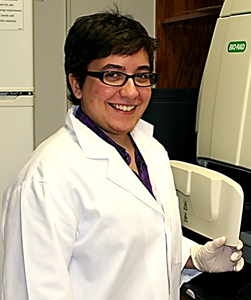
Stacey Mont, Ph.D.
Department: Cancer Biology, 2016
Faculty Mentor: Michael Freeman, Ph.D.
Dissertation Title: Accumulation of γKetoaldehyde-modified Protein in Normal and Fibrotic Lung
Dissertation Abstract: γKetoaldehydes are generated by free radical peroxidation and cyclooxygenation of phospholipid-esterified arachidonic acid. γKetoaldehydes covalently bind to protein lysine residues and is emerging as a mechanistic link between pathogenic reactive oxygen species and disease progression. However, the questions of whether covalent modification of proteins by γKA are subject to genetic regulation and the identity of γKA-modified proteins remain unclear. This dissertation shows that Nrf2 and Nox2 are key regulators of γKA modification in pulmonary tissue. The identity of these proteins were analyzed by LC-MS following immunoaffinity purification of γKA-modified proteins. Gene ontology analysis revealed that proteins in numerous cellular pathways are susceptible to γKA modification. Although cells tolerate basal levels of modification, exceeding them induces apoptosis. Prominent modification was observed in a murine model of radiation-induced pulmonary fibrosis and in idiopathic pulmonary fibrosis (IPF) patients, two diseases considered to be promoted by gene-regulated oxidant stress. This dissertation found an abundance of γKA modified protein in human IPF compared to control lung tissue, identified collagen 1α1 as one of the highly adducted proteins, and demonstrates that γKA modification impairs MMP1 mediated degradation of collagen. Based on these results the current hypothesis is that γKA modification is a hitherto unrecognized sequelae that contributes to radiation-induced pulmonary injury and IPF.